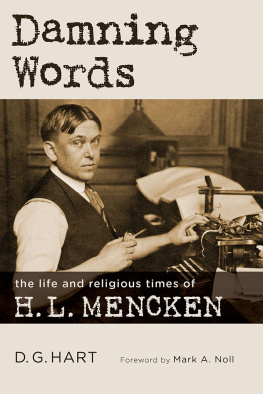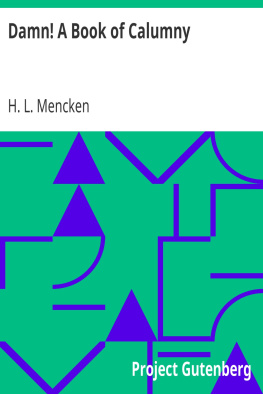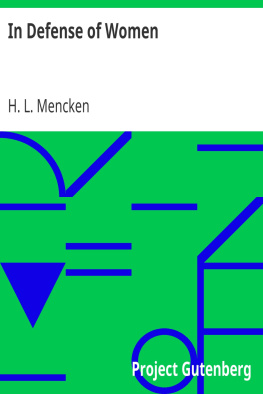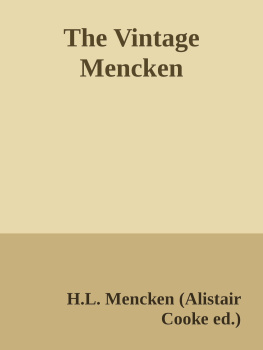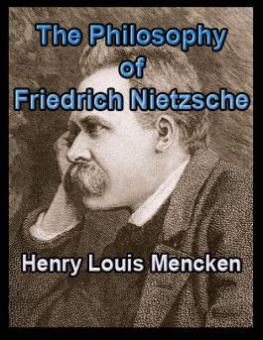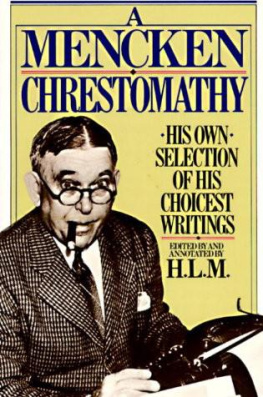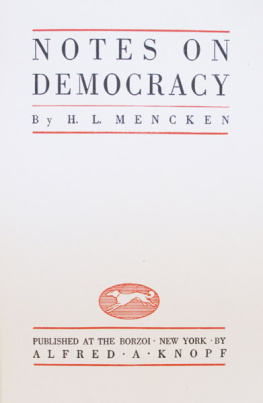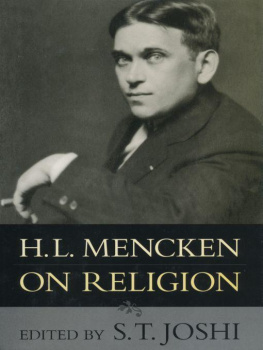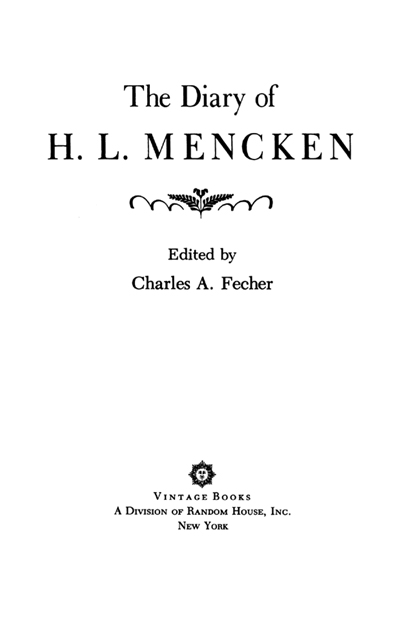Praise for
The Diary of H. L. Mencken
Menckens diary is funny, outrageous, authoritative, and tender in turns. His writings are clear and precise, and like nearly all of the millions of words he turned out in his lifetime, they are interesting. It tells valuable stories about people in the arts and letters of the people; it provides rich political profiles and sketches of men of power; and it contains quasi-essays about the state of American journalism at the time.
Christian Science Monitor
Mencken was an inveterate gossip, in the best sense, which is what makes the Diary so engaging as literary history. The book is a cornucopia of portraits of a wide range of literary, political and journalistic figures of the 1930s. And, of course, in the background there is the dynamo of Menckens mind humming away, throwing off sparks of wit and cynicism.
The Nation
Being opinionated was Menckens stock-in-trade. He did much to shatter the genteel tradition in American literature because, like George Bernard Shaw (a comparison he would loathe), he turned the venting of prejudice into an art form. Because Mencken was a terrific writerblunt, colorful and confidentthere is some fun to be had listening to the old boy grouse and rant.
San Francisco Chronicle
The Diary of H.L. Mencken is filled with everyday activities as well as amusing remarks The fact is that one can read Menckens diary for its prejudices and Roosevelt-hating politics or one can savor it for its literary and social observations.
The New York Times
One finds an incredibly complex man. His intellectual curiosity was exemplary; his industry was indefatigable; his encyclopedic knowledge was extraordinary, and his smooth writing makes even the mundane interesting. His flashes of humor could be ribald, cutting, and, on rare occasions, self-deprecating. The diary alone contains biting, insightful and sometimes funny references about encounters with Theodore Dreiser, F. Scott Fitzgerald, John Dos Passos, William Faulkner, Sinclair Lewis and others.
Cleveland Plain Dealer
A beautifully edited and lively look at the day-by-day life of a towering figure in journalism and language. Fechers editing is superb, always illuminating, often wryly humorous, never getting in the way.
Boston Herald
Mencken comes off as a more likeable character here than he does in most previous accounts written by or about him: a devoted husband and friend, a conscientious participant in business affairs at Knopf and the Baltimore Sunpapers, a lover of music, terrapin and beer. You will discover a depth of humanity and feeling in the Sage of Baltimore for which nothing previous can have prepared you.
Jonathan Yardley
ALSO BY CHARLES A. FECHER
Mencken: A Study of His Thought
FIRST VINTAGE BOOKS EDITION, JANUARY 1991
Copyright 1989 by Enoch Pratt Free Library
All rights reserved under International and Pan-American Copyright Conventions. Published in the United States by Vintage Books, a division of Random House, Inc., New York, and simultaneously in Canada by Random House of Canada Limited, Toronto. Originally published in hardcover by Alfred A. Knopf, Inc., New York, in 1989.
Library of Congress Cataloging-in-Publication Data
Mencken, H. L. (Henry Louis), 18801956.
The diary of H. L. Mencken / edited by Charles A.
Fecher.1st
Vintage Books ed.
p. cm.
eISBN: 978-0-307-80886-8
1. Mencken, H. L. (Henry Louis), 18801956Diaries.
2. Authors, American20th centuryDiaries.
I. Fecher, Charles A. II. Title.
[PS3525.E43Z463 1991]
818.5203dc20
[B] 90-50174
v3.1
Contents
List of Illustrations
Following :
George Jean Nathan and H. L. Mencken
Announcing the Hatrack decision in Boston, 1926
Mencken and his wife, Sara Powell Haardt, 1933
Formal portrait, 1939In the backyard garden at 1524 Hollins Street, 1939
Mencken in his second-floor study at Hollins Street, 1939
Visiting the home of Alfred A. Knopf, 1940
Working on the galley proofs of The American Language
Covering the 1948 Republican Convention in Philadelphia
A page from the diary in Menckens typing
The Diary of H. L. Mencken, in the boxes in which it lay sealed for twenty-five years
H. L. Mencken (uncaptioned)
Introduction
I
H. L. Mencken made the first entry in his diary on November 5, 1930. He was fifty years old at the time, and that is rather late in life for someone to begin the practice of keeping a more or less daily record of the events that befall him and the thoughts that occur to him. Earlier that year he had published the book which, in his own judgment, was the best thing he had ever written (Treatise on the Gods), and already it had gone through seven printings. In August he had gotten married (also rather late in life) and had moved from the long-familiar surroundings of 1524 Hollins Street to a handsome apartment downtown. He was deeply and romantically in love, his love was fully returned, and the future had never looked brighter.
There is an ironywhich he could neither have intended nor foreseenin the fact that he began the diary in the first year of a new decade. The one that had ended ten months before had been his in a very real sense. It was during the 1920s that he established himself as the most powerful and original force in American literary criticism, a force that might be admired or detested but could not possibly be ignored. There had simply never been anything like it beforecriticism had never spoken in such tones. Utterly unafraid, he heaped ridicule on established figures who had long been revered, and eagerly hailed new writers who were bringing a fresh and more realistic voice to the novel and short story. His influence was immensea word of praise from Mencken could give an aspiring young author the feeling that he had arrived.
In 1924 he and George Jean Nathan, after ten years of co-editing The Smart Set, had founded The American Mercury, and with its very first issue it had taken a place beside such venerable competitors as Harpers, Scribners, The Atlantic Monthly, and The Century. Its appeal was, quite frankly, to the civilized minority; its purpose, set forth in an opening editorial, was to attempt a realistic presentation of the whole gaudy, gorgeous American scene. It succeeded far beyond the expectations of its publisher and its editors. Though he had no desire whatever to be a hero to sophomores, that was in fact the way it turned out: to be seen carrying a copy of the Mercury across a college campus became an instant mark of sophistication and advanced intelligence. When, a year later, Nathan withdrew, it became literally and wholly Menckens magazine.
Between 1920 and 1930 he published five of the six volumes of his Prejudices, the second and third editions of The American Language, a translation of Nietzsches Der Antichrist, and Notes on Democracy. He collaborated with Nathan on The American Credo, a contribution toward the interpretation of the national mind, and on a farcical play,


